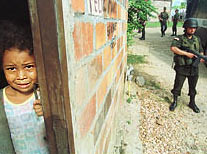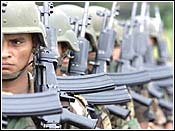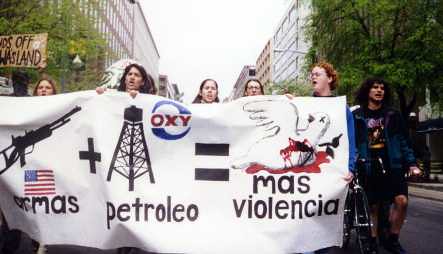Colombian Chaos
 For the last forty years, the country of Colombia has been ravaged by a deep civil war between three major factions: the leftist rebel group Revolutionary Armed Forces of Colombia (FARC), the rightwing paramilitary United Self-Defense Forces of Colombia (AUC), and the Columbian government's own military and police forces.
For the last forty years, the country of Colombia has been ravaged by a deep civil war between three major factions: the leftist rebel group Revolutionary Armed Forces of Colombia (FARC), the rightwing paramilitary United Self-Defense Forces of Colombia (AUC), and the Columbian government's own military and police forces.The rebel FARC grew out of an indigent movement against a foreign-dominated economy and brutal Colombian government tactics. Despite the growing numbers of poor, many of the political reforms have given way to the lucrative earnings in kidnapping and drug trafficking. Many FARC operations are bankrolled by smaller drug cartels that cannot afford government bribery.
The rightwing AUC was a grass-roots movement within the government's own military in retaliation against the rebels. It is still heavily supported by local police/military as well as rival drug lords. There are still many allegations of covert ties between government and AUC operations. Officially, the Colombian government condemns the AUC though it continues to offer funds and protection to them.
 In 2000, President Clinton began the $1.3 billion "Plan Colombia", intended to increase the strength of the Colombian military and police to combat the flow of cocaine into the US. President Bush established his own $1.33 billion version in 2001 named the Adean Counter-drug Initiative (ACI), increasing the scope from "narcotic operations" to "narco-terrorism". This helped justify Colombian President Alvaro Uribe's use of certain "anti-terrorism" laws since 2002. The Foreign Military Fund also increased drastically from $17 million in 2003 to almost $100 million in 2005 under the Bush Administration.
In 2000, President Clinton began the $1.3 billion "Plan Colombia", intended to increase the strength of the Colombian military and police to combat the flow of cocaine into the US. President Bush established his own $1.33 billion version in 2001 named the Adean Counter-drug Initiative (ACI), increasing the scope from "narcotic operations" to "narco-terrorism". This helped justify Colombian President Alvaro Uribe's use of certain "anti-terrorism" laws since 2002. The Foreign Military Fund also increased drastically from $17 million in 2003 to almost $100 million in 2005 under the Bush Administration.The Plan Colombia started as a two-pronged attack against drug traffickers. The first side is to increase the military power of the Colombian government, so that it can better crush the rebels. The second is the highly controversial measure to decrease cocaine supply by dusting cocoa fields with the herbicide glyphosate. There is evidence that this creates more environmental damage to the surrounding areas than it does in reducing cocaine production.
But what is less documented are the US petroleum interests in Colombia. According to AmazonWatch.org, the ties between the Los Angeles Occidental Petroleum (OXY) and US-Colombian policy are very tight indeed:
Occidental was a powerful force behind the passage of Plan Colombia and increased U.S. military aid to Colombia, spending over $9 million on direct lobbying and donating $1.5 million to federal campaigns between 1995 and 2000.I think it is quite unsurprising the results of this kind of US policy: more chaos than ever before. The idea of increasing aggressionon to reduce it is ludicrous, as the World Policy Institute Special Report details:
At the center of Bush's 2004 aid package is up to $147 million appropriation to boost security for OXY's frequently bombed Cao Liman oil pipeline. The aid package constitutes an unprecedented public revelation of President Bush's shift from a strategy based on drug interdiction to counter-insurgency. The main beneficiary is OXY who would get more than a $4.50 dollar a barrel subsidy from American taxpayers while the U'wa and other local communities in the region suffer through further environmental devastation and increased violence.
According to a study by the Rand Corporation, U.S. weapons and military training have "fanned the flames of the violence in Colombia." Their detailed report, Arms Trafficking and Colombia, traces the path of small arms and light weapons from U.S.-origin stockpiles in Nicaragua, El Salvador and other Cold War battlegrounds in Central America to Colombia, where they are used by State Department-labeled terrorist groups. These weapons have ended up in the hands of the leftist Revolutionary Armed Forces of Colombia (FARC) and the rightwing AUC.The House of Representatives is expected to vote on the foreign operations bill the week of June 27. U.S. aid to Colombia is one of the provisions of the appropriations package. The bill currently contains President Bush's full request of $742 million in aid for a new phase of Plan Colombia. Last week, the House subcommittee on foreign operations rejected a request to add another $130 million to the bill for additional aid to the military/police and coca crop fumigation; nevertheless, the funding in this bill is still primarily directed toward military aid. Rep. Jim McGovern (D-MA) will offer an amendment to cut a portion of the military aid and transfer it to developmental aid instead when the bill reaches the floor for a vote.
The U.S. weaponry and military aid that has fueled the brutal war in Colombia have not succeeded in stemming the flow of drugs into the United States. In fact, a study by the Washington Office on Latin America found that the cocaine is 31% cheaper on the streets of the United States than it was before Plan Colombia was initiated.
Along with the FARC and the AUC, the Colombian military and police are collectively responsible for the most human rights violations in the Western Hemisphere.
According to the State Department's 2004 Human Rights Report, "some members of the security forces continued to commit serious abuses, including unlawful and extrajudicial killings and forced disappearances. Some members of the security forces continued to collaborate with the terrorist AUC, which committed serious abuses."
Some of the worst political violence and human rights abuses took place in areas controlled by U.S. oil companies. A portion of U.S. military assistance is designated for protecting oil businesses- specifically Occidental Petroleum. Amnesty International asserts that in 2003, $99 million in U.S. aid went to protecting the oil pipeline.
Still not convinced that US funding is just making the Colombian chaos worse? Read Global Exchange's Top 10 Reasons to Oppose US Military Aid. If you want the US to stop funding more violence and begin funding important infrastructure in Colombia, then drop your representatives a line. Let's focus on solutions, not create bigger problems.



0 Comments:
Post a Comment
<< Home